Introduction
The Small Business Association reports that women own 9.9 million businesses in the US and generate over $1.4 trillion in annual sales. If this economic contribution weren’t enough, these businesses are also responsible for employing over 8.4 million people. This value is even greater in minority communities where women are more likely to own businesses than in non-minority communities and actually saw their businesses grow throughout The Great Recession.
Yet in spite of this impressive contribution, women-owned small businesses produce less revenue than their male counterparts. On the magnitude of 1.86 times less!
With women making up such a huge expanse of our businesses and workforce, but clearly facing different dynamics than their male counterparts, we wanted to know just how they were thinking about their businesses at the start of the new year. So, we asked! We surveyed male and female small and mid-sized business (SMB) owners across industries to understand what their attitudes, hopes, and concerns were for 2019.
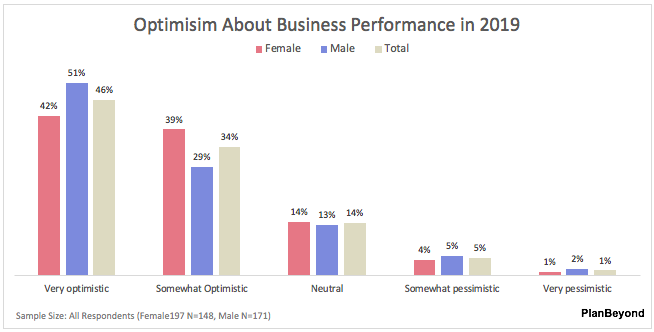
SUMMARY FINDINGS
- Women are 21% less likely than men to feel very optimistic about how their businesses will perform in 2019.
- Women point to the quality of their product or service as the #1 reason behind future business success; men point to the quality of their team.
- Female SMB owners are 43% more likely than men to be concerned about limited access to money affecting their businesses as keeping them back from strong performance in the new year.
- 25% of women don’t believe they have a strong sales plan in place to tide them through 2019.
- Nearly 40% of women say marketing skills are missing from their organization, a 24% higher rate than men.
- Women are nearly as likely to have problems finding employees with the right skills as they are finding employees with the right drive or motivation, same as men.

Key Findings
How are women feeling about their business performance in the new year versus men? Turns out that everyone is feeling hopeful, but women aren’t feeling quite as hopeful. While women and men are equally likely to feel optimistic about how their businesses will perform in 2019, women are 21% less likely than men to feel “very†optimistic.
What’s especially unique about this optimism dynamic is that men don’t tend to be more optimistic about particular elements in their business than women. In fact, women are significantly more confident than men that the strength of their existing customer base and the quality of their products or services will result in a strong 2019.
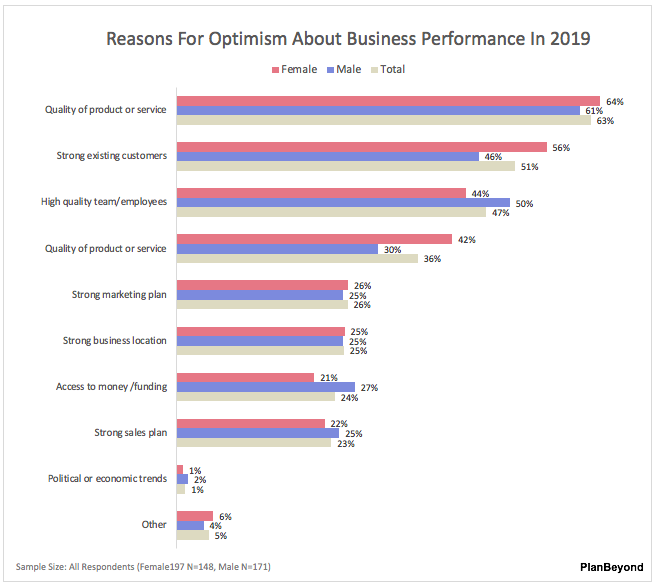
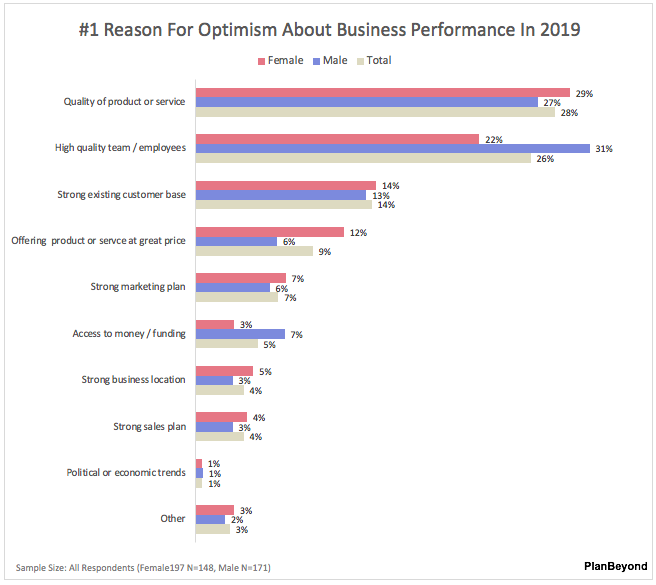
However, when we asked men and women SMB owners to pick the #1 reason behind their optimism for the new year, men were significantly more likely to point to the quality of their employees. This dynamic becomes less surprising when you consider research that shows male-owned SMBs tend to have more employees than women-owned SMBs; more employees could easily mean having more in-house skills and expertise to support business goals.
However, when we turned the question around and asked what might lead men and women SMB owners to be concerned about how their businesses will perform in the new year, things got interesting. Women were 43% more likely than men to be concerned about limited access to money or funding as well as 42% more concerned about weaknesses in their sales plans. They were also directionally more likely to show concerns over their marketing plans. This isn’t to say male SMB owners aren’t concerned…but rather they have fewer overall concerns than women.
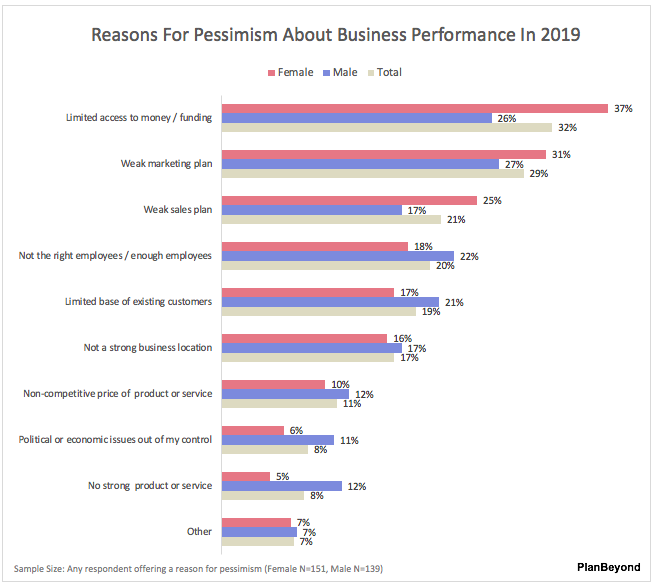
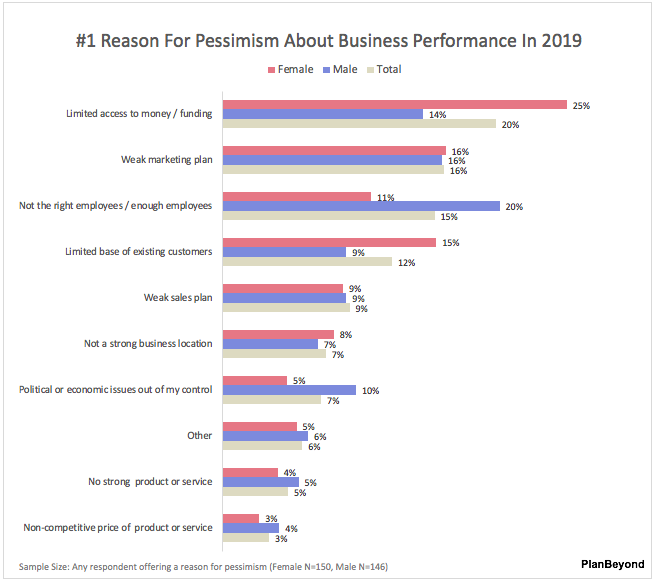
When we made men and women pick the #1 thing that had them concerned about 2019 business performance, limited access to funds was the top reason chosen by women. In contrast, the top reason chose by men was not having enough employees or the right employees on-hand. Men may have the financial resources they need to hire employees but are challenged with finding the right people. Meanwhile, it appears that women haven’t yet overcome the funding hurdle itself.
What we were surprised to see was the divide in skills sets men and women SMB owners said were missing from their organizations. 39% of women pointed to marketing as a core skill area their organizations were missing, which was 24% higher than men.
In contrast, 32% of men said sales expertise was missing from their organizations, which was 24% higher than women commenting on the same missing skill.
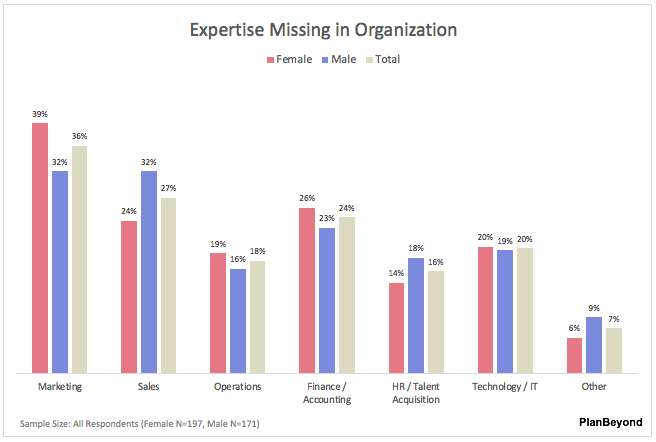
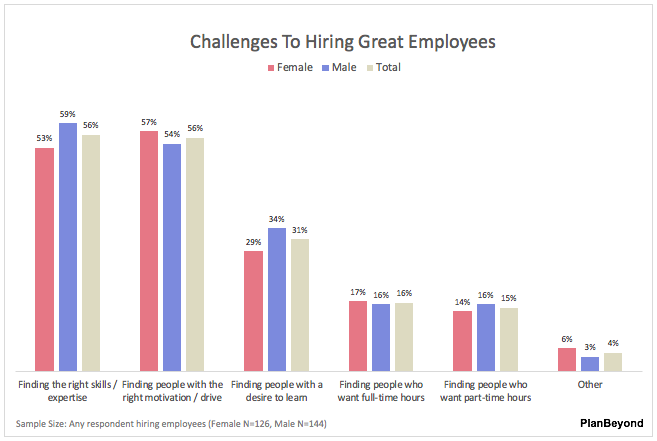
In spite of all these differences between female and male SMB owners, they are consistent in one key challenge: finding the right employees! Just over half of male and female business owners reported that finding employees with the right skill set was a key hiring challenge, nearly the same number reporting that hiring employees with the right motivation and drive was a major challenge.
Conclusion
While women and men are generally optimistic about how their businesses will perform in 2019, women are telling us they are generally less confident than men. While we can’t gauge if this confidence gap is due to women actually having fewer skills or resources than their male counterparts, or due to their perceptions of their skills and resources, the fact remains that the gap exists.
So, how do we help close the gap? Especially when women business owners are telling us they’re already concerned about having limited resources and funds?
One easy (and free!) solution is to be proactive about accessing the resources that are being made readily available. From the Small Business Association to major non-profits, a host of tools are available to learn the basics of business and then hone-in on particular functional skill areas. However, going it alone can be lonely. That’s why online and offline communities founded by women for women (like the Female Founders Alliance, The Riveter, Female Founders Fund and Underwire), are hitting us at just the right time.
Let’s say goodbye once and for all to support groups, and instead hello to tangible resources and how-to’s to get the job done better, and real-world introductions to people who can help make it happen. As we enter 2019, women-owned business will be younger and less-resourced than those owned by men. Hopefully, as we enter 2025, we will be able to say we’ve closed a good chunk of this gap.
Methodology
Respondents were recruited between Thursday, November 29, 2018 and Friday, November 30, 2018 via Survey Monkey’s Contribute and Rewards panel. The panel is comprised of individuals who voluntarily join to earn credits that can be redeemed for rewards or charity donations, and the panel is balanced according to age and gender census data. Individuals were screened prior to survey entry to ensure that they were at least 18 years of age and self-identified as owning a small-to-mid-sized business in the United States.
A total of 368 respondents were recruited and asked a series of questions around future business performance, and reasons for optimism/pessimism about business performance. Respondents were asked to self-report gender to segment respondents into male and female cohorts.





